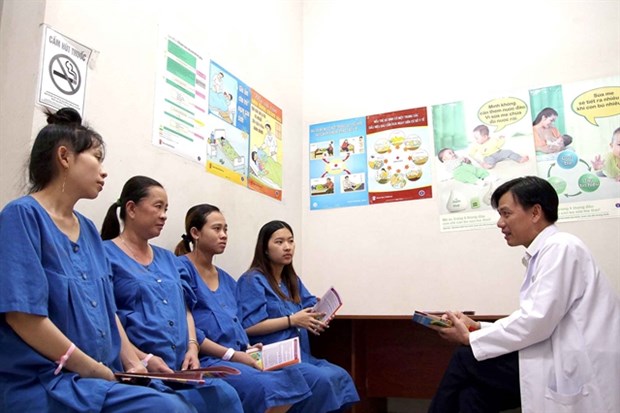Vietnam must reduce gender imbalance at birth: official
Gender imbalance at birth in Vietnam must be rectified, or it will produce unpredictable consequences and threaten population stability and the sustainable development of the country, the Ministry of Health’s General Office for Population and Family Planning said.
 Dr. Truong Chi Nguyen, head of the Birth Department at Ca Mau Province’s Obstetrics and Children's Hospital, consults pregnant women on reproductive health care and gender imbalance at birth. (Photo: VNA)
Dr. Truong Chi Nguyen, head of the Birth Department at Ca Mau Province’s Obstetrics and Children's Hospital, consults pregnant women on reproductive health care and gender imbalance at birth. (Photo: VNA)Deputy director Pham Vu Hoang said the imbalance started in Vietnam in 2006 but has increased fast in both urban and rural areas.
According to the General Office for Population and Family Planning, the country's sex ratio at birth has reached 112 boys per 100 girls in 2021. Vietnam is among three countries with the highest rate of sex ratio imbalance, behind only China and India.
The northern midlands and mountains was the region with the highest level of imbalance with 114.1 boys, followed by the Red River Delta with 110.6 boys. There are six provinces with a sex ratio at birth more than 120 boys – Bac Giang, Ha Nam, Hung Yen, Son La, Hoa Binh, and Ba Ria – Vung Tau.
Vietnam is one of few countries in the world where sex imbalance occurs at the first birth, which means that couples have pursued sex selection for their first child.
The level of sex ratio imbalance at birth is much higher in couples with high education and good economic status.
Gender stereotypes are root causes
Hoang said there are many causes for the gender imbalance at birth in Vietnam, but the root causes are gender stereotypes.
The idea of respecting men and disrespecting women is a traditional concept of Vietnamese people. This gender-biased concept has been perpetuated from generation to generation, negatively affecting the position and role of women in the family and society.
In addition, new techniques for sex selection have increased dramatically in recent times. Most people can access ultrasound and abortion services for the purpose of sex selection. Despite Government regulations prohibiting fetal sex determination and all forms of sex selection, it is still easy for mothers and fathers to obtain information about the sex of the fetus.
Weak social security for the elderly also contributes to the issue. In rural areas, many elderly people do not have a pension or social assistance, so they all depend on their children, mostly sons, to take care of them. When a daughter marries, she is considered to be joining her husband's family, so many people feel anxious and insecure for the future without a son.
In rural areas, hard work requires men's manual labour. Therefore, a son is both a spiritual and economic pillar for the whole family. New social norms such as small families with only one or two children are also a motivation for couples to seek fetal sex selection services, he said.
“Gender imbalance has caused many consequences”, Hoàng stressed. “One of the immediate and visible consequences is marriage pressure, caused by a shortage of women.”
It is forecasted that by 2034, Vietnam will have an excess of 1.5 million males aged 15-49 and this number will increase to 2.5 million in 2059 if the current sex ratio at birth remains unchanged.
This will make it difficult for many men to get married, especially those with low socio-economic backgrounds, he said.
The increase in the sex ratio at birth also poses high risk of gender inequality, child marriage, inbreeding marriage and violence and trafficking in women and girls. Many women are forced to have multiple abortions to get a son, adversely affecting their health, increasing the cost of health care and reducing the income of the whole family, he said.
Worse, women may be subjected to stigma, discrimination, and even violence due to son preference. The value and status of a woman without a son is reduced, he added.
Men's role re-evaluated
The gender imbalance at birth will only be completely resolved when long-term and durable solutions are taken to deal with son preference, improving the status of women, and making an equal society, Hoang emphasised.
The Government's project on controlling gender imbalance at birth in the 2016-2025 period has raised people's awareness of the issue. The sex ratio at birth has decreased from 112.8 boys in 2015 to 112.1 boys in 2020, reaching the project's target.
But more should be done to advance the role of men in their families and promote men’s participation in housework.
The Responsible Father Programme is an example. The project, jointly conducted by the Vietnam Farmers’ Union and the United Nations Population Fund, engages men to take part in building healthy and equal relationships in their families.
The project has been piloted in northern Bac Giang, central Quang Binh and southern Ba Ria – Vung Tau provinces and has shown positive results.
A Facebook group, created by the Centre for Children and Development and the United Nations Population Fund, has attracted hundreds of men as it helps to create a forum for fathers to share and retell their stories as well as help them re-evaluate their own behavior and their roles in the family.
Nguyen Thị Thu Ha, Communication Director of the Centre for Children and Development, said that fathers have discussed parenting issues and mother-in-law and daughter-in-law relationships every week.
The discussion with the support of psychologists and educators has helped fathers have different perspectives on gender equality, she added./.











